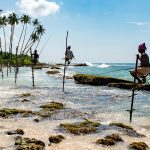The Ayalik Fund broadens horizons through outdoor exploration
The Ayalik Fund hosted twelve Inuit youth from Nunavut on a canoe expedition in Yellowknife, Northwest Territories
By: Ian Stalker
Adventure Canada is helping introduce young people from a part of the world that produced a distinct type of boat that’s propelled by paddling to parts of the country that produced another distinct type of boat that’s propelled by paddling.
The company, best known for its Arctic cruises, is working with The Ayalik Fund, which works to build self-esteem and confidence among Inuit youth in Nunavut by having them participate in challenging outdoor adventures, meeting other young Canadians and engaging in what’s labeled “social-cultural exploration” while doing so.
And among those explorations was a two-week canoe trip for 12 Nunavut youth in July in sub-Arctic wilderness northeast of Yellowknife with Yellowknife-based outfitter Jackpine Paddle, which has a history of operating youth programs. The two weeks included pre-trip training at a base camp.
The Ayalik Fund’s David Pelly — who started the fund with his wife Laurie in memory of their son Eric Ayalik Okalitana Pelly — says last summer’s trip definitely won’t be the last waterborne excursion it arranges for Inuit youth.
“There will be more such canoeing journeys, many of them,” states Pelly, who has joined Laurie as an Adventure Canada expedition team leader. “Ayalik has been offering various types of challenging expeditions to Inuit youth for the past six summers, including canoe trips in the N.W.T. and Ontario, but also including sea-kayaking in B.C., backpacking treks in the Rockies, and tall-ship sailing in eastern Canada. We have major plans for several canoe trips next summer.”
But why the need to introduce canoeing to people whose ancestors created the kayak, a boat now hugely popular with water enthusiasts and wilderness explorers?
“This is a very important question,” Pelly replies. “First of all, very few Inuit youth today have ever been in either a canoe or a kayak. The purpose of the Ayalik Fund is not to reintroduce or connect Inuit youth to their cultural roots. There are some other programs within Nunavut that have this worthy objective. Ayalik is about broadening their horizons, about new experiences, travel to new places, and facing new challenges. Most of our youth have never been down south before (“down south” within Canada). On these trips they meet, interact with, and become friends with their peers from other parts of Canada. In the case of the recent N.W.T. trip, they were travelling with a dozen Dene youth from the Liidlii Kue First Nation (in Fort Simpson, N.W.T.) This, we believe, affords them a new-found pride in who they are. A canoe trip is a wonderful way for a youth group to bond as a team, for each individual to achieve a sense of accomplishment, and to grow their self-confidence. That is our core goal.”
The Pellys started the fund in memory of their adopted son Eric, who was from the Nunavut community of Cambridge Bay. He grew up loving hockey and canoeing before his sudden death from a medical issue at 19. The Ayalik Fund says those growing up in Nunavut have a “foot in two worlds” and their parents sometimes have limited resources, which may prevent their children from reaching their full potential.
It sends Northern teens on different types of wilderness excursions, including canoeing trips in the likes of northern Ontario’s Temagami region and on the the Northwest Territories’ Coppermine and Keele Rivers. The latter was a 300-kilometre journey with fast moving water but didn’t see “one dumped canoe” the fund reports.
“There is another reason why a canoe trip is probably a better approach than a sea-kayak trip,” Pelly continues. “Others may expect them to have some natural affinity to the kayak. Southern Canadian youth on the trip might expect the Inuit to already know how to manage a kayak. By joining a canoe trip, they are placed on an equal footing with the other youths, and when they excel at something new they feel even better about it.
“All of the youth we have engaged in canoe trips over the years have loved it, for the reasons suggested above. They take to it quite naturally, both boys and girls. It has become a central element of our program, and is very popular with the youth. They regularly ask: ‘Can I go on another canoe trip next summer?’ Almost all of the boys on the N.W.T. trip this past July have, in fact, made just that request. Several of them will be doing so. That said, introducing Nunavumiut to canoeing is not our program’s objective. It is a means to an end.”
Meanwhile, Pelly says Adventure Canada has been a “very significant supporter and sponsor of the Ayalik Fund” from its inception in 2015. Funding for all of the youth trips comes from private sources, rather than government, and many of the individual donors to the Ayalik Fund — which is a charitable foundation — resulted from the Adventure Canada connection.
“We are deeply indebted to Adventure Canada, most appreciative,” he adds.
More information can be found at www.AyalikFund.ca.

















